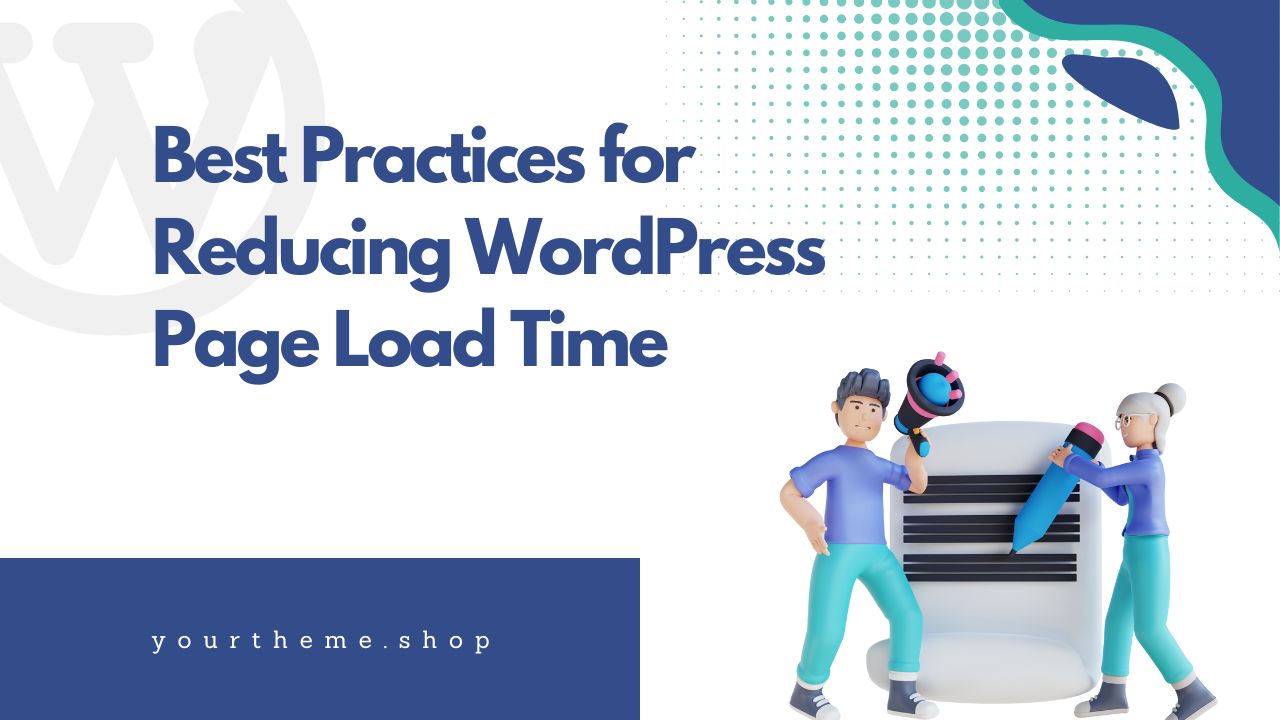In the digital age, the speed of your WordPress site is a critical factor in its success. Users expect quick, responsive websites, and search engines like Google prioritize faster sites in their rankings. This is where the best practices for reducing WordPress page load time come into play, ensuring your site not only attracts visitors but also keeps them engaged.
Best Practices for Reducing WordPress Page Load Time
Comprehensive Analysis: Why WordPress Sites Slow Down
Identifying the Root Causes
WordPress sites can experience slowdowns due to a variety of factors. It’s essential to identify these root causes to apply the best practices for reducing WordPress page load time effectively.
Suboptimal Hosting Solutions
One of the primary reasons for a slow WordPress site is inadequate hosting. Hosting solutions that do not offer sufficient resources or are not optimized for WordPress can significantly hinder site performance.
Bloated Themes and Excessive Plugins
Themes and plugins add functionality and style to WordPress sites. However, using too many plugins or a feature-heavy theme can lead to a bloated website, slowing down the load time. It’s crucial to use lightweight themes and limit the number of plugins.
Unoptimized Content
Large, unoptimized images and videos can drastically increase page load times. Optimizing these elements is a key aspect of speeding up your WordPress site: top practices for reducing page load time include compressing images and using video hosting services.
Implementing Effective Strategies
Choosing the Right Hosting
Selecting a WordPress-optimized hosting solution is one of the effective strategies to cut WordPress load times. Managed WordPress hosting, for instance, can offer optimized performance tailored for WordPress sites.
Theme and Plugin Management
To boost website performance, it’s important to choose lightweight themes and only install necessary plugins. Regularly reviewing and removing unused plugins can prevent unnecessary strain on your website’s resources.
Content Optimization
Optimizing images and videos to reduce their file size without compromising quality is crucial. Tools and plugins for image compression and video optimization play a significant role in improving user experience: best practices to reduce WordPress page load time.
Regular Maintenance and Updates
Keeping WordPress, themes, and plugins up to date ensures optimal performance and security. Regular maintenance, including database optimization, is also a key practice in reducing page load time.
Advanced Optimization Techniques
Leveraging Caching Solutions
Using caching solutions can significantly speed up page loading by storing a static version of your pages, reducing server processing time.
Implementing a Content Delivery Network (CDN)
A CDN can distribute your site’s content across a network of servers worldwide, reducing the distance between the server and the user, thus improving load times.
Minimizing HTTP Requests
Reducing the number of HTTP requests by combining files, optimizing scripts, and using sprite sheets can help in boosting website performance.
Database Optimization
Regularly cleaning and optimizing the WordPress database can prevent sluggishness caused by accumulated data.
Strategic Optimization: Enhancing WordPress Speed
To speed up your WordPress site, it’s crucial to focus on top practices for reducing page load time. This includes choosing the right hosting environment, optimizing images, and using caching solutions. Each step plays a significant role in improving the overall performance of your WordPress site.
Practical Steps: Implementing Speed Enhancements
To speed up your WordPress site, start by optimizing images. Large images can significantly slow down page load times. Use tools like Adobe Photoshop or free online image compressors to reduce file sizes without compromising quality. This is a crucial step in the best practices for reducing WordPress page load time.
Minimizing CSS and JavaScript
Streamlining Code
Minimizing the size of CSS and JavaScript files is another top practice for reducing page load time. Tools like Autoptimize can help you remove unnecessary characters from your code, reducing file sizes and improving load times. This step is essential in boosting website performance.
Leveraging Caching
Implementing Caching Plugins
Caching is a powerful method to cut WordPress load times. Plugins like WP Rocket or W3 Total Cache store a static version of your pages, reducing the load on your server and speeding up access for visitors. This aligns with the best practices to reduce WordPress page load time.
Choosing the Right Hosting
Selecting Performance-Oriented Hosting
Your hosting provider plays a significant role in your site’s performance. Opt for a host known for its speed and reliability. Managed WordPress hosting can offer specific optimizations, making it a top practice for reducing page load time.
Regular Updates
Keeping WordPress Up-to-Date
Ensure your WordPress core, themes, and plugins are always updated. Updates often include performance improvements, crucial for improving user experience by reducing WordPress page load time.
Using a Lightweight Theme
Selecting Speed-Optimized Themes
Choose a theme designed for speed. Heavy themes with lots of features can slow down your site. A lightweight, streamlined theme is a key strategy in boosting website performance.
Implementing Lazy Loading
Loading Content on Demand
Lazy loading delays the loading of images and videos until they are needed, which is an effective strategy to cut WordPress load times. This not only speeds up initial page loads but also saves bandwidth for users who don’t scroll through the entire page.
Database Optimization
Cleaning and Maintaining the Database
Regularly clean your WordPress database to remove unnecessary data. This can include spam comments, old revisions, and transient options. Tools like WP-Optimize can automate this process, aligning with the best practices for reducing WordPress page load time.
Reducing External HTTP Requests
Limiting Use of External Resources
Minimize the use of external scripts and fonts to reduce the number of HTTP requests. This is a crucial aspect of speeding up your WordPress site and falls under top practices for reducing page load time.
Implementing a CDN
Distributing Content Globally
Use a Content Delivery Network (CDN) to distribute your content across multiple servers worldwide. This ensures that users access your site from a server close to them, significantly improving load times and enhancing user experience.
Compressing Files
Utilizing GZIP Compression
Enable GZIP compression to reduce the size of your files before they are sent to the browser. This can be done via plugins or by modifying your .htaccess file. It’s a straightforward yet effective strategy to cut WordPress load times.
Avoiding Overuse of Plugins
Keeping Plugin Usage to a Minimum
While plugins add functionality, having too many can slow down your site. Regularly review and deactivate or delete any plugins you don’t use. This practice is essential in improving user experience by reducing WordPress page load time.
User Experience Focus: The Benefits of a Fast WordPress Site
A fast WordPress site significantly improves user experience. Best practices to reduce WordPress page load time not only enhance the speed but also the usability of your site. This leads to higher user satisfaction, increased engagement, and better conversion rates.
Performance Metrics: Measuring the Impact of Your Efforts
Understanding Performance Metrics
To truly grasp the effectiveness of your optimization strategies, it’s essential to delve into performance metrics. These metrics offer a quantitative basis to assess how well your site is performing post-optimization.
Tools for Performance Measurement
Google PageSpeed Insights stands out as a premier tool, providing a comprehensive analysis of your site’s speed and user experience. This tool is instrumental in pinpointing areas that need improvement and validating the success of your optimization efforts.
Analyzing PageSpeed Insights Reports
The reports from PageSpeed Insights are divided into various sections, each offering valuable insights:
Speed Score
This section reflects the overall speed of your site. A higher score indicates better performance, directly correlating with improved user experience and potentially higher search engine rankings.
Optimization Opportunities
Here, you’ll find specific suggestions to further enhance your site’s performance. Implementing these can significantly contribute to reducing WordPress page load time.
Diagnostics
This part provides insights into more technical aspects of your site’s performance, helping you understand complex issues that might be slowing down your site.
Passed Audits
This section lists the areas where your site is performing well, affirming the successful application of best practices for reducing WordPress page load time.
Regular Monitoring and Updates
Continuously monitoring these metrics is crucial. Regular updates and tweaks based on these insights are key to maintaining and improving site performance.
Impact of Optimization on User Experience
Improving user experience is a direct outcome of optimizing your site’s performance. Best practices to reduce WordPress page load time not only speed up your site but also enhance user satisfaction and engagement.
SEO Benefits of Performance Optimization
Speeding up your WordPress site through top practices for reducing page load time can have a significant positive impact on your SEO. Faster sites are favored by search engines, leading to better visibility and higher rankings.
Boosting Website Performance
Effective strategies to cut WordPress load times go beyond basic optimizations. They involve a holistic approach to website performance, encompassing everything from server configuration to content optimization.
The Role of Content Delivery Networks (CDNs)
Utilizing CDNs can drastically improve your site’s load times, especially for a geographically diverse audience. CDNs store cached versions of your content in multiple locations, reducing the load time significantly.
Importance of Mobile Optimization
In today’s mobile-first world, ensuring your site is optimized for mobile devices is crucial. This involves responsive design and mobile-specific speed optimizations, playing a vital role in reducing WordPress page load time.
Future-Proofing Your WordPress Site
Staying ahead of the curve in terms of technology and trends is essential for maintaining optimal site performance. Regularly updating your strategies to boost website performance ensures your site remains fast and efficient.
Advanced Topics: Taking WordPress Speed to the Next Level
For those looking to take their WordPress site’s performance to the next level, there are advanced strategies to cut WordPress load times. This includes leveraging the latest web technologies, advanced caching mechanisms, and fine-tuning your server settings for optimal performance.
Case Studies: Real-World Examples of Improved WordPress Speed
Learning from real-world examples is invaluable. Case studies of successful WordPress speed optimizations provide insights into what worked, what didn’t, and how similar strategies can be applied to your site.
Elevate your WordPress site’s performance with top practices for reducing page load time. From hosting choices to advanced optimizations, boost speed and user satisfaction for a future-proofed website.






